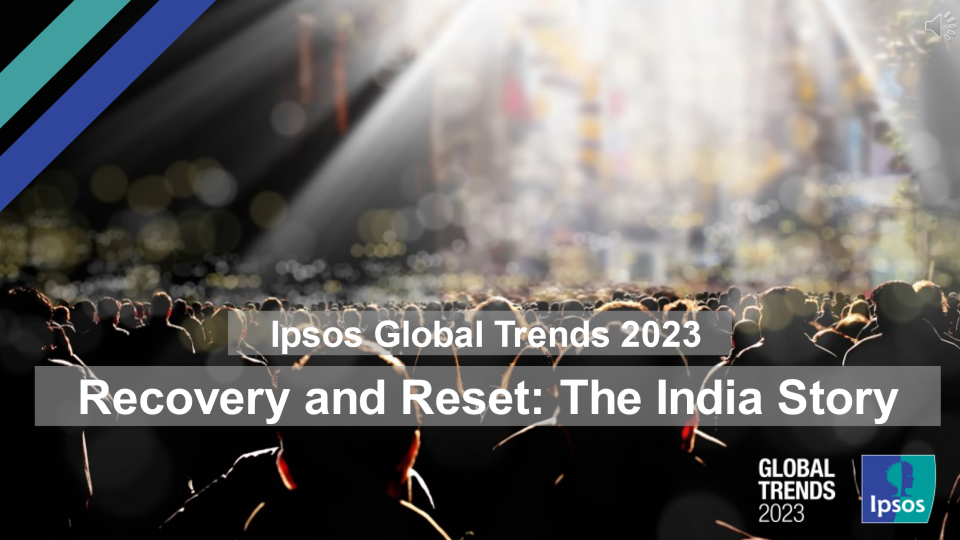

Ipsos Global Trends 2023 India Edition
Welcome to Ipsos Global Trends. This is our broadest edition ever, covering 50 markets, 87% of the global economy and 70% of the global population. It reveals as much continuity as change.
Some key points from our global report:
The world isn’t in crisis. The world is in crises.
As we enter 2023, we’ve emerged from a global pandemic only to find ourselves immersed in a looming financial crisis, a climate crisis, a war waged by Russia on Ukraine – which is causing an energy crisis – and long-standing inequalities blooming into geopolitical crises around the world.
The biggest concern: an economic crisis that is sharpening an economic divide and raising questions around the role of business.
Another shift we are seeing is a growing tension between global and local.
Meanwhile, climate change has become a visceral reality and existential threat: in 2022 we saw 10 climate-related disasters top $3bn each in damages.
Moving to the India 2023 Edition…
In India we have covered a broad spectrum of the urban populace, focusing on the relatively affluent, Digitally savvy consumers and also the Urban masses.
As the world grapples with a poly-crisis of war, inflation, and a looming environmental crisis, Indians appear to be more hopeful and looking to normalize their lives post-pandemic, in their own ways.
A dichotomy exists, however, between the Urban Masses and the Digital Citizens. This dichotomy has its roots in the pandemic itself and thus the normalization or recovery from its effects are also divergent. The pandemic impacted the economy, but this was possibly felt more by the Urban mass consumers. They are now seeking to maximize the economic opportunities that are again available as India emerges from the pandemic. On the other hand, the prolonged and intense exposure to all things digital has led to some fatigue for Digital Indians; they are now seeking a return to more authentic experiences and are looking back with nostalgia to a time when life was simpler.
Both these recovery journeys are likely to have far-reaching consequences for marketers. Let’s first look at how some of these are playing out for the relatively affluent Digital Citizens. The following attributes have seen significant changes in the current round in India, compared to previous.
- Digital Citizens are worried about too much of technology destroying lives, and this is further reflected in concerns about data privacy among the younger, and social media companies yielding too much power; among the older.
- They want to return to “touch and feel” experiences they enjoyed, as opposed to digital always – a significant uptrend in shopping in physical stores is simpler than in E-com.
- Among this trend, all attributes around simplicity, authenticity and nostalgia see a significant upswing, some specific attributes demonstrating these are ‘increasingly feel a need to spend time alone’, ‘wish life were simpler’ and ‘given choice, prefer to have grown up at a time when parents were children’.
But we see different directions in these trends when it comes to the Urban Masses.
- There are significant uptrends in concerns about wealth disparity, and the feeling of a world changing too fast. With the pandemic having impacted economic opportunities for this cohort, they now clearly want to catch up.
- They want to embrace technology as an enabler in this journey and dismiss concerns about data privacy as inevitable.
- E-Commerce adoption is likely to keep rising among this cohort, but possibly driven more by discounts and convenience rather than premiumisation or authentic brand affinity.
- They show a marked decline in attributes related to simplicity, authenticity, and nostalgia; they possibly feel these are the intellectual pursuits of the elite.
- This “reset” in the working status of women and their long confinement at home has led to an increase in defining the role of women more traditionally – as wives and mothers rather than bread earners.
There are however some similarities too among the two cohorts. There is more harmony when it comes to
- Being in control of their and their family’s health. This is also marked by an emerging consciousness around Mental health.
- There is also an establishment of faith in medical institutions, vaccines, and medical professionals.
- Importance of career and making a mark. Faith in business leaders and institutions can act as enablers.
- Confidence in globalization as an enabler to aspiration and being open to settling abroad.
Amit Adarkar, CEO, Ipsos India said, “Ipsos Global Trends 2023 has been our biggest broadest capture and tracking of the trends globally. In India we are happy to have a robust and representative survey backing the findings. The India edition provides a window to how consumers across India are normalizing and this is of import to all marketers as they seek to connect deeper with their consumers in sync with these post-pandemic shifts.”






